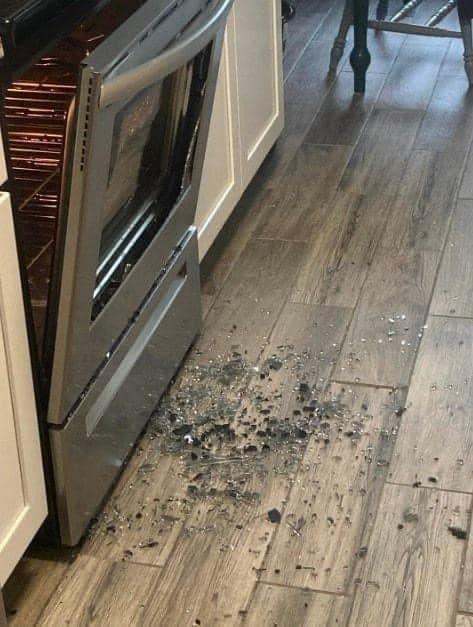The Mysterious Problem of Exploding Glass Oven Doors
Willie Mae Truesdale’s evening was interrupted by a loud noise echoing from her kitchen. When she went to investigate, she found shattered glass scattered across her kitchen floor—the oven door had inexplicably broken into pieces. “It was shocking; you really had to see it to believe it,” Truesdale said. “The glass was shattered and spread out on the floor.” She was left even more puzzled since her oven hadn’t been in use at the time. Unfortunately, Truesdale isn’t the only homeowner who’s faced this unnerving issue of an oven door breaking seemingly on its own.
Other Cases of Shattering Oven Doors
Cheryl, a suburban mom, encountered a similar incident during the COVID-19 lockdown. While attempting to bake brownies, she noticed they weren’t cooking evenly and were still wet in the center. Though her oven was only a few months old, she found its temperature ran about 25 degrees off. Once lockdown restrictions eased, she contacted a repair service. However, before a technician could come, she tried using the oven’s self-cleaning function. Just as it was nearly finished, there was a loud bang, and the inner glass of the oven door shattered.

Michelle Wheat had a similarly frightening experience when her oven door exploded, scattering glass throughout her kitchen. Like Truesdale, Wheat’s oven wasn’t even in use when the explosion happened. Fortunately, her four young children were not injured by the flying glass. Wheat’s oven, a Frigidaire model, encountered the same problem as Cheryl’s Bosch appliance. Reports of similar incidents with various brands, from Frigidaire to others, indicate that exploding oven doors aren’t limited to one brand. According to the Consumer Product Safety Commission, there have been roughly 450 reports of such incidents since 2019.
Manufacturers’ Responses to Consumers
Each of these women faced issues with their oven manufacturers following the explosions. Although Truesdale’s oven was still under warranty, the Frigidaire technician who arrived blamed the explosion on her family’s usage, despite the oven being off at the time. Ultimately, she was left to pay for a replacement door out of pocket. In Cheryl’s case, Bosch replaced her oven after NBC reached out for a statement on her behalf. Wheat, however, had no such luck, as her appliance was no longer under warranty. She paid $100 for the technician’s visit only to be told the glass was indeed broken and required replacement. The additional cost of a new door reached $314. Frigidaire even recommended she buy an extended warranty to prevent similar issues. “This shouldn’t have happened,” expressed Wheat, frustrated with her mounting expenses. “That’s the point I was trying to make to them.”
Why Do Glass Oven Doors Shatter?
So, what’s behind these sudden glass explosions? According to Mark Meshulam, a Chicago-based glass expert, there are two types of glass commonly used in oven doors: soda-lime glass and borosilicate glass. “Soda-lime glass is the same as typical window glass, but it’s tempered by rapid heating and cooling,” Meshulam explained. “Borosilicate glass, which you might know from old Pyrex cookware, is more heat-resistant and less prone to sudden breaks.” Soda-lime glass, however, isn’t as resilient under intense thermal cycles, which can lead to cracking or shattering over time.
A separate factor, called a nickel sulfide inclusion, can also cause glass to explode. “It’s a tiny, almost invisible defect—only about a tenth of a millimeter in diameter,” said Meshulam. “It’s like a ticking time bomb in the glass, trying to release itself. A high-heat event, like an oven cleaning cycle, can trigger a sudden failure.” While Meshulam emphasizes that the self-cleaning feature is generally safe, he notes that a minor chip or defect can cause spontaneous shattering, even when the oven isn’t in use. The scary part? This kind of breakage can happen long after any initial damage occurs, catching homeowners off guard.
Tips to Prevent Glass Breakage
Unfortunately, not all causes of glass breakage are preventable. Damage during manufacturing, shipping, or installation can lead to long-term weaknesses in the glass. Still, homeowners can take steps to minimize risks. For instance, using a soft sponge or cloth for cleaning is far safer than using abrasive tools, which can create tiny scratches. Avoid placing dishes on the oven door, as this can weaken the glass over time. When closing the door, do so gently; slamming or kicking it can cause micro-damage that weakens its structure. Ensure that oven racks are positioned correctly to prevent them from coming into contact with the door. Also, avoid hanging wet towels on the door handle, as the weight and moisture can strain the glass.
Additional precautions include checking that cookware inside the oven doesn’t touch the glass door and steering clear of high-impact behaviors, like pushing or bumping against it. Extreme temperature shifts, like cooling a hot oven door with cold water, can also weaken the glass.
What’s Next for Homeowners?
The rising number of incidents raises questions for both manufacturers and consumers. Many users feel that warranties should cover glass shattering, especially if the appliance was unused at the time of the incident. Experts recommend that manufacturers consider using borosilicate glass more widely due to its heat-resistant properties. Until then, taking preventative steps can at least reduce the risk.
For consumers like Truesdale, Cheryl, and Wheat, unexpected expenses and frightening moments highlight a pressing need for awareness. Manufacturers could benefit from clearer communication about proper care and potential risks. As it stands, oven owners can only do their best to protect themselves and their families by handling glass components carefully.





